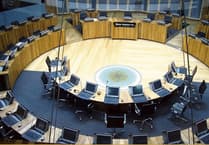CALLS are being made for a specific plan to tackle poverty in rural parts of Wales.
Last year, it was revealed that Ceredigion has the second-highest rate of child poverty in Wales.
A new report, commissioned by Mid and West Wales MS, Cefin Campbell, is now calling for a specific strategy to meet the needs of people who don't live in the big cities and towns.
According to the report, households in rural areas spend typically £27 more a week on transport and around £4 a week extra on food than people living in more urban areas.

This is coupled with average incomes in Ceredigion, Pembrokeshire, Gwynedd and Powys being among the lowest in Wales.
Llandysul business owner Sandra Richards-Davies said that rural transport was a big issue.
Sandra said: "One of the biggest things is the transport infrastructure.
"The Bwcabus ended with us fairly quickly and it was used by a lot of elderly people from the hinterlands of Llandysul.
“And without that, we’ve lost their business to the local economy, but also, we have put those people in a situation where they are fairly isolated.”
Rhydian Thomas, who runs a bus company in Pencader, said: “We spend around £2,000 a week on diesel, so if I were to save two or three pence per litre (through a potential Rural Fuel Tax Relief scheme), over a week, over a month, over a year, it will add up quite a bit."
Mr Campbell MS has launched a new strategy based on research on the causes and drivers of rural poverty.
Critically, the strategy proposes that there should be a statutory duty for public bodies in Wales to fully rural proof their policies and programmes.
He said: “We know – and the evidence shows – that rural poverty and urban poverty are different – they have different causes, drivers and consequences. Throughout my time in the Senedd, I have been calling on the Welsh Government to develop a tailored strategy to tackle rural poverty and promote rural development. These calls have consistently fallen on deaf ears, so I have undertaken to develop such a strategy myself.
“These include measures to improve access to and take of benefits in rural areas, investment in our bus network, expansion of the childcare offer, and new supports for rural businesses.
“Above all, the strategy highlights a need for policies at all levels to be properly rural proofed, and for this need to be put on a statutory footing, following the example of Northern Ireland’s Rural Needs Act.”
A spokesperson for the Welsh Government said that getting rid of poverty is a priority and that support should be available to everyone in all parts of Wales.
"However, we recognize that the experience of poverty can be different for many in rural areas and that the increase in living costs has affected rural households particularly hard.
"We want to help people through these difficult times and people can find help on this number for the 'Claim what you deserve' line 0808 250 5700."




Comments
This article has no comments yet. Be the first to leave a comment.